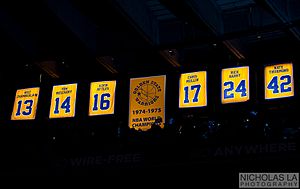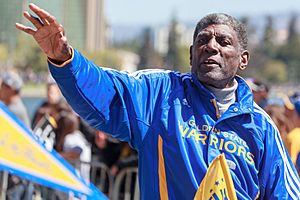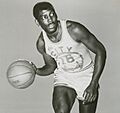Al Attles facts for kids

Attles with the San Francisco Warriors in 1970
|
|
| Personal information | |
|---|---|
| Born | November 7, 1936 Newark, New Jersey, U.S. |
| Died | August 20, 2024 (aged 87) Oakland, California, U.S. |
| High school | Weequahic (Newark, New Jersey) |
| Listed height | 6 ft 0 in (1.83 m) |
| Listed weight | 175 lb (79 kg) |
| Career information | |
| College | North Carolina A&T (1956–1960) |
| NBA Draft | 1960 / Round: 5 / Pick: 39th overall |
| Selected by the Philadelphia Warriors | |
| Pro career | 1960–1971 |
| Coaching career | 1968–1983, 1994–1995 |
| Career history | |
| As player: | |
| 1960–1971 | Philadelphia / San Francisco Warriors |
| As coach: | |
| 1968–1970 | San Francisco Warriors (assistant) |
| 1970–1983 | San Francisco / Golden State Warriors |
| 1994–1995 | Golden State Warriors (assistant) |
| Career highlights and awards | |
As player:
As coach:
|
|
| Career statistics | |
| Points | 6,328 (8.9 ppg) |
| Rebounds | 2,463 (3.5 rpg) |
| Assists | 2,483 (3.5 apg) |
Alvin Austin Attles Jr. (born November 7, 1936 – died August 20, 2024) was an American basketball star. He was a player, coach, and executive for the Golden State Warriors team in the National Basketball Association (NBA).
People called him "the Destroyer" because of his strong defense. Attles played as a point guard. He spent his whole career with the Warriors. He joined them when they were in Philadelphia and moved with them to the San Francisco Bay Area in 1962.
Al Attles became a player-coach in 1970. He then became the full-time head coach. He led the Warriors to an amazing NBA championship win in 1975. Later, he also worked as the team's general manager.
The Warriors honored him by retiring his jersey number 16 in 1977. He was also added to the Naismith Memorial Basketball Hall of Fame in 2019. Attles worked for the Warriors for over 60 years, helping the team in many ways.
Contents
Early Life and Education
Al Attles grew up in Newark, New Jersey. He went to Weequahic High School. After high school, he studied at North Carolina A&T State University. He earned degrees in Physical Education and History. He also got a master's degree in teaching.
Attles planned to go back to Newark to coach at a junior high school. But then the Warriors drafted him to play basketball. He first said no, but then he decided to join the team.
Playing Career Highlights
The Philadelphia Warriors picked Al Attles in the 1960 NBA draft. He was a fifth-round pick. On March 2, 1962, Attles scored 17 points in a famous game. This was the night Wilt Chamberlain scored 100 points!
Attles moved with the team to the Bay Area in 1962. He played for them until 1971. He was known as "the Destroyer" because he was a tough defender. He was a key player on the 1964 Warriors team. This team reached the NBA Finals but lost to the Boston Celtics. He also played on the 1967 Warriors team that played in the championship series.
Coaching the Warriors
Al Attles became the Warriors' player-coach during the 1969–70 season. He was one of the first African-American head coaches in the NBA. He stopped playing after the 1970–71 season. But he stayed on as the head coach.
In 1975, Attles led the Warriors to an NBA championship. His team, led by Rick Barry, beat the Washington Bullets. The Bullets were expected to win, but the Warriors surprised everyone! This made Attles the second African-American coach to win an NBA title.
The Warriors tried to win again the next year. They made it to the conference finals but lost. Attles coached the Warriors until 1983. He had a great record with 557 wins and 518 losses. He is the longest-serving coach in Warriors history. He also has the most wins as a coach for the team.
After coaching, Attles worked as the Warriors' general manager from 1983 to 1986. He even returned as an assistant coach for one season in 1994–95.
Honors and Legacy
Al Attles received many honors for his contributions to basketball. In 2014, he got the John W. Bunn Lifetime Achievement Award. This is a very special award from the Naismith Memorial Basketball Hall of Fame. It honors people who have done a lot for the sport.
The Warriors retired his jersey number 16. This means no other player on the team will ever wear that number again. His college, North Carolina A&T, also retired his number 22 in 2015. He was the first person to have his number retired by his college team.
Attles was also inducted into the Bay Area Sports Hall of Fame in 1993. In 2017, he received the Chuck Daly Lifetime Achievement Award. This award honors coaches for their long careers and good sportsmanship.
On April 6, 2019, Al Attles was officially chosen as a member of the Naismith Memorial Basketball Hall of Fame. He worked for the Warriors for over 60 years, which is the longest time anyone has worked for one team! He was a team ambassador and community relations representative.
Personal Life
Al Attles married Wilhemina Rice in 1963. His Warriors teammate, Wilt Chamberlain, was his best man at the wedding. They had two children together. His grandson, Isaiah Attles, played college basketball.
Al Attles passed away at his home in Oakland, California, on August 20, 2024. He was 87 years old.
Images for kids
See Also
 In Spanish: Al Attles para niños
In Spanish: Al Attles para niños
 | George Robert Carruthers |
 | Patricia Bath |
 | Jan Ernst Matzeliger |
 | Alexander Miles |






